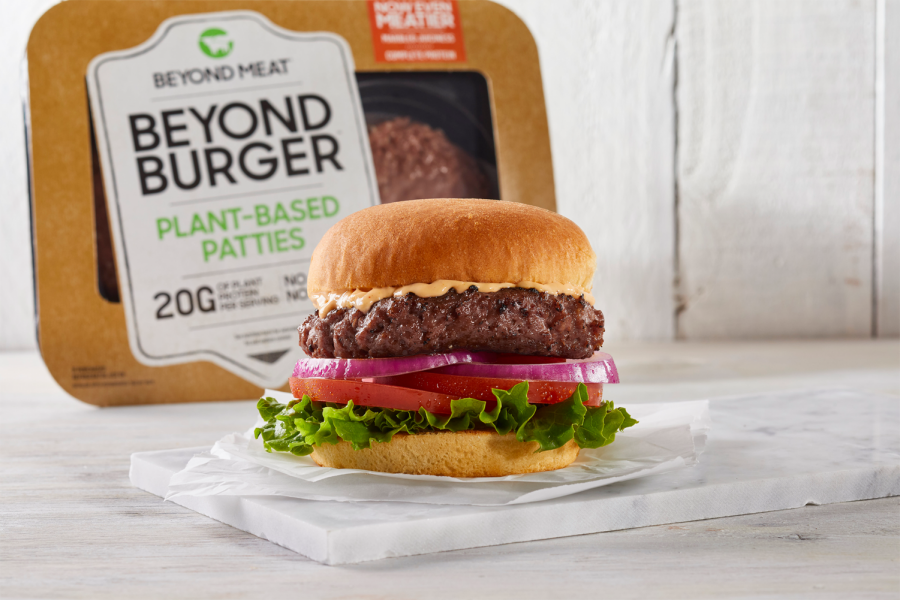2020’s Food Trend: Plant-Based Meat
January 13, 2020
With the rise of vegetarianism and veganism, coupled with increased consumer interest in eating healthier, plant-based meat has become the food trend that will define this first year of the new decade. Plant-based meat was always an option available on the market for at least 20 years, but it was not until the summer of 2019 when Burger King released the Impossible Whopper, the first-ever burger released by a fast food chain to contain a plant-based patty which mimics the texture and taste of beef as opposed to being a traditional veggie burger made from grain or tofu, that it started to really experience the current boom of popularity.
According to CNet, “The Impossible Whopper is made by Impossible Foods, which is known for its vegan burger that tastes a lot like real beef. Founded in 2011, the company was first to use a key ingredient called heme, a blood-like compound found in all living things and that can replicate the taste, color and aroma of meat. Other ingredients include plant-based products like soy, potato protein and coconut oil.” After the gargantuan success of Burger King’s Impossible Whopper, other chains followed in Burger King’s footsteps throughout late 2019. By 2020, Impossible burgers can be found on the menus of Red Robin, White Castle, Hard Rock Cafe and the Cheesecake Factory – as well as Applebee’s, but only at locations throughout New York State. Ground-up Impossible meat is available at Qdoba and Little Caesar’s.
Another popular plant-based meat alternative served at fast food restaurants is Beyond Meat, made from pea protein and beet juice. The beet juice gives Beyond Meat the ability to bleed like real meat. TGI Fridays, Burger Fi, Bareburger, Veggie Grill, Carl’s Jr., A&W, Del Taco, and Dunkin’ all serve Beyond Meat.
Why, exactly, did the popularity of plant-based meat explode? The most obvious reason, as listed earlier, is because of consumers’ rising interest in reducing the amount of meat in their diets. Consumers tend to go meatless either to watch their weight, to help the environment, or both. A study published in the Journal of General Internal Medicine in 2015, performed by a group of Harvard researchers, detailed the results of an experiment on the effects of vegetarianism and veganism on the body during weight loss. As reported by NPR,
“The researchers started with 1,513 studies and narrowed them down to 12 that met their criteria. The studies had to be original, randomized controlled trials that looked solely at vegan or lacto-ovo-vegetarian diets. They also had to compare them with non-vegetarian diets and evaluate the resulting changes in body weight…The results of the meta-analysis, published in Journal of General Internal Medicine, found that those on vegetarian diets lost around 4.4 pounds more than the control group (who had no change in diet), while those on a vegan diet dropped 5.5 pounds more.”
As for the effects of going meatless on the environment, it saves the lives of cows as well as decreasing the amount of greenhouse gases, which cause global warming and tear holes in the ozone layer, dumped into the environment. As stated by The Guardian, “A vegan diet is probably the single biggest way to reduce your impact on planet Earth, not just greenhouse gases, but global acidification, eutrophication, land use and water use. It is far bigger than cutting down on your flights or buying an electric car,” he said, as these only cut greenhouse gas emissions.”
Secondly, it is conveniently found at any supermarket. ShopRite, Target, Safeway, Costco, and even Stop & Shop sell Beyond Meat and other plant-based meat alternatives, so access to plant-based meat is simple and easy for any consumer.
As it is both beneficial for our bodies and the environment, plant-based meat appears to be more than just a passing fad like the bacon craze of 2012 and 2017’s “unicorn food” – it’ll likely be here to stay as a healthful alternative to traditional meats, much like the humble avocado and the rise of matcha.












